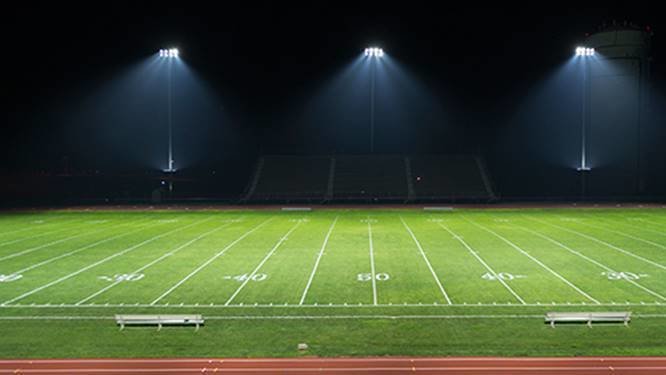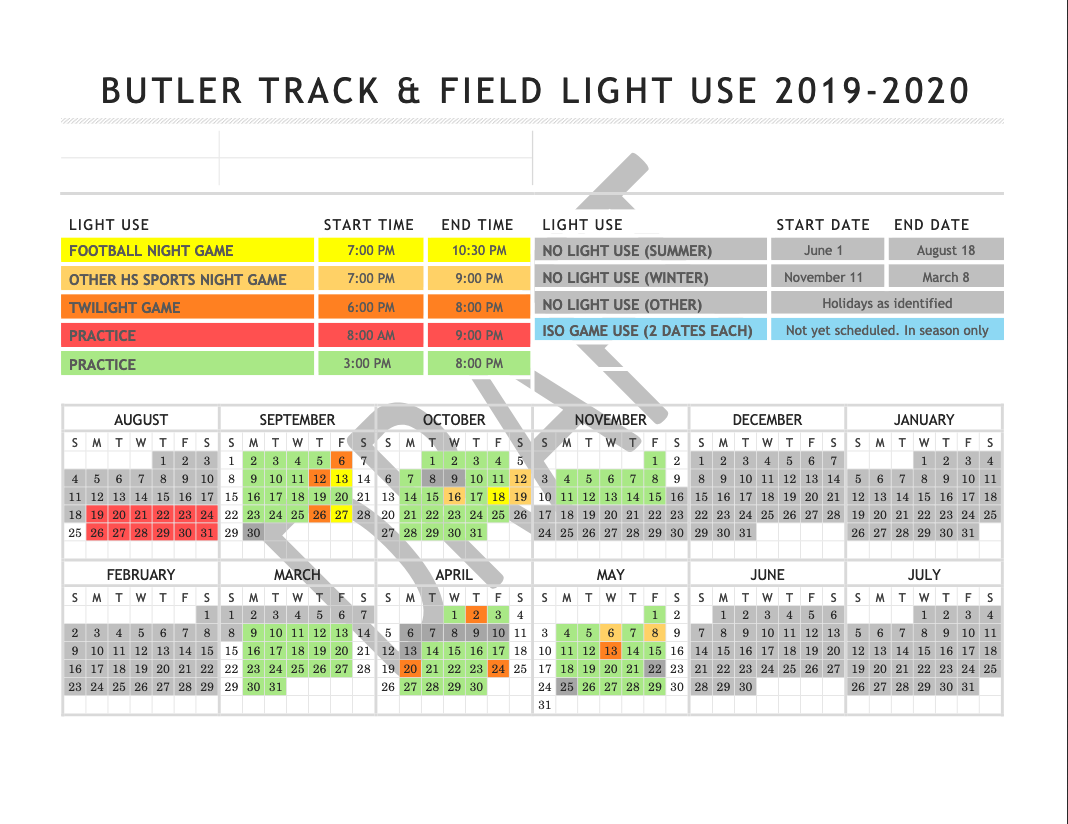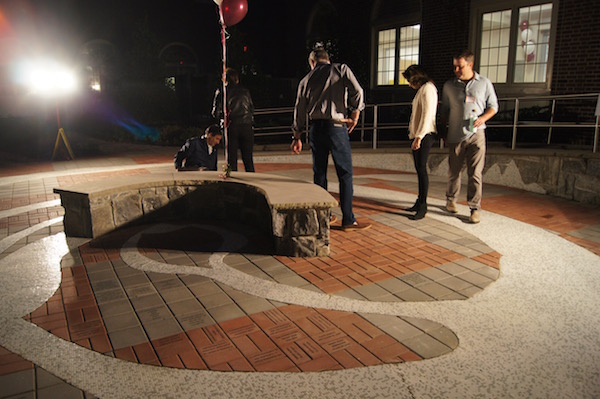Lights On at Butler Field – How Many Hours Per Week?
- Wednesday, 01 May 2019 09:47
- Last Updated: Thursday, 02 May 2019 13:43
- Published: Wednesday, 01 May 2019 09:47
- Joanne Wallenstein
- Hits: 3961
 How many nights would the lights be on at Butler Field if the plan to install them goes ahead? And how would the lights, noise and traffic impact the neighborhood?
How many nights would the lights be on at Butler Field if the plan to install them goes ahead? And how would the lights, noise and traffic impact the neighborhood?
That’s what Scarsdale Athletic Director Ray Pappalardi sought to clarify at the Scarsdale Board of Education meeting on Monday night April 29. Using a rubric from Rye, Pappalardi mapped out a plan for how many nights the lights would be on until 8 pm, 9 pm and 10:30 pm.
Discussing the mitigation of effects from noise, light and traffic, Pappalardi conceded that the district would not be able to manage unamplified noise during evening practices and games. He said there was no way to control the sound of kids playing, referees whistles and spectators cheering. However the use of a targeted sound system, which could be purchased for around $30,000, would control the effects of amplified sound from the announcer.
About the light, Pappalardi suggested that the planting of a natural screen of Green Giant Arborvitae would help to cut down on the light on the neighbors and quoted a fee of $5,000 for 50 trees.
About the schedule, Pappalardi showed the proposed calendar below outlining the field usage and “lights out” times for field usage based on 2019-20 dates.

He anticipated the following number of night games per year:
Up to 15 scheduled night games
--5 with lights off by 10:30 pm
--10 with lights off by 9:00 pm
Up to 4 playoff games with lights off by 10:30 pm
Up to 2 night games for each youth Independent Sports Organization including Rec Football, Boys' Soccer, Girls' Soccer, Boys' Lacrosse & Girls' Lacrosse for a total of 10 games.
That makes 29 night games per school year.
Lights would be used for the fall season from August 19 to November 15 and in the spring from March 9 through May 29.
In addition, the lights would be used for practices almost every night during the season until 8 pm. Here is what the proposed memorandum outlines:
“A maximum of ninety (90) athletic practices and twilight games (other than weekend events) using lights shall be allowed at the stadium during any given school year. Within the 90 events, a maximum of thirty (30) practices may be scheduled in the fall and spring and shall end with lights off by 8:00p.m, Monday through Friday only. An additional maximum of thirty (30) events may be scheduled in the fall and spring as twilight games at the stadium in any given school year. These games shall be scheduled Monday through Friday only with lights off by 8:00p.m. or 30 minutes after the end of the event in case of an injury delay, overtime or a significant public safety event.”
It is interesting to note, that the document from the Rye Board of Education upon which the Scarsdale draft is based allows for a total of 16 night games – rather than 29 games in the Scarsdale draft, and 70 practices until 8 pm in Rye, rather than 90 in the Scarsdale draft.
In the public comments portion, the Board heard from both a supporter of the plan and a neighbor with concerns about the policy.
Speaking for the “Light the Future Committee” of Maroon and White , Matt Conlan of Madison Road discussed the benefits of the lights and the need for a tiered donation policy.
He said, “350 players use the field and another 400 use it occasionally. That’s more than half the school. Extending the usage beyond sunlight is a huge asset for the community…. Through discussions we have learned that the neighbor’s biggest concern is the noise that accompanies field usage. Ray has been looking at an amplified system that will be a win-win. Garbage, parking and traffic have also been brought up and will be addressed by the school’s event management strategy.
…This will allow practices and games that were otherwise shortened by sundown to be played and conducted normally. This will allow them to play their full games.
…Among our prospective donors there are a lot of principled objections, that our property taxes, the highest in the country, can’t cover lights on the sole turf field in the community. The community wants lights, the student athletes certainly want lights and having a donor recognition plan is critical to raising money outside the school budget. …
Our intention is to recognize every donor … no matter the size…. The lower donors (will be recognized in the Scarsdale  Maroon and White is requesting a tiered donor recognition policy as there will not be enough space or funds to recognize all donors with inscribed pavers.Inquirer, on our website and in our sports journal. Permanent recognition costs money and takes up space. A paver brick costs about $35. Making that available for a $250 donation means that 15% goes back into it. … We don’t have a enough physical space to put a brick down for every $250 increment of donation – We will be seeking a tiered recognition plan with $1,000 as the minimum for recognition for practical reasons….
Maroon and White is requesting a tiered donor recognition policy as there will not be enough space or funds to recognize all donors with inscribed pavers.Inquirer, on our website and in our sports journal. Permanent recognition costs money and takes up space. A paver brick costs about $35. Making that available for a $250 donation means that 15% goes back into it. … We don’t have a enough physical space to put a brick down for every $250 increment of donation – We will be seeking a tiered recognition plan with $1,000 as the minimum for recognition for practical reasons….
…The plan needs to be tiered so that we can recognize a $10,000 donor – rather than ten, $1,000 donations. The real inclusivity is the lights. That’s what we should be focused on. Everyone will benefit from those lights. Our purpose is to improve the athletic experience for everyone.”
Commenting on the proposed schedule of use for the lights, Susan Kohn of 20 Carstensen Road thanked Ray and community leaders who have worked together. She said, “We only saw the proposed policy on Thursday. The neighbors will provide you with feedback on the policy. …We used a policy that was adopted by Rye as a starting point but the proposed policy is much broader than the one in Rye and much broader than the neighbors would feel is satisfactory in terms of scopes of usage….
…. Our concerns are real. Weekly practices every night on weeknights are a living reality for those of us who live around the field …. it’s week night, school night disruption for every night of the school year. While we support student athletics the concept of well-being and having quiet in order to study – as academics come first – is of primary importance.”
Commenting after the meeting, Kohn added: "With respect to the proposal that Ray provided to the Board, involved neighbors are concerned about a number of provisions. In general and among other things: The hours and frequency of usage are too broad; there is no statement of consequences for violations or mechanism for enforcement; and there are continuing concerns about the level of noise, light, and traffic even with proposed amelioration, as we are being asked to make a leap of faith that the proposed systems will work. (For instance, we do not have engineering specifications or other objective information on which to evaluate the effectiveness of the proposed lighting and sound systems.) There are legitimate concerns about the effects of extended use of the field on students, including those on the field and those in neighboring houses (these two groups are not mutually exclusive - we are parents of student athletes, too!), that have not been studied or addressed.
We will be submitting a more detailed response to the Board and to Ray shortly. The issues raised by the current proposal are not unique to a community like Scarsdale. Please note that the policy in Rye, which was used as a model for Ray’s draft, better addresses many of our concerns. For instance, frequency and time periods permitted for usage of lights are much greater in Ray’s proposal than what is permitted in Rye, and Rye’s proposal clearly sets forth consequences for policy violations."
The Board also reviewed proposed changes to the district gift policy concerning donor recognition and other matters that can be reviewed here.






